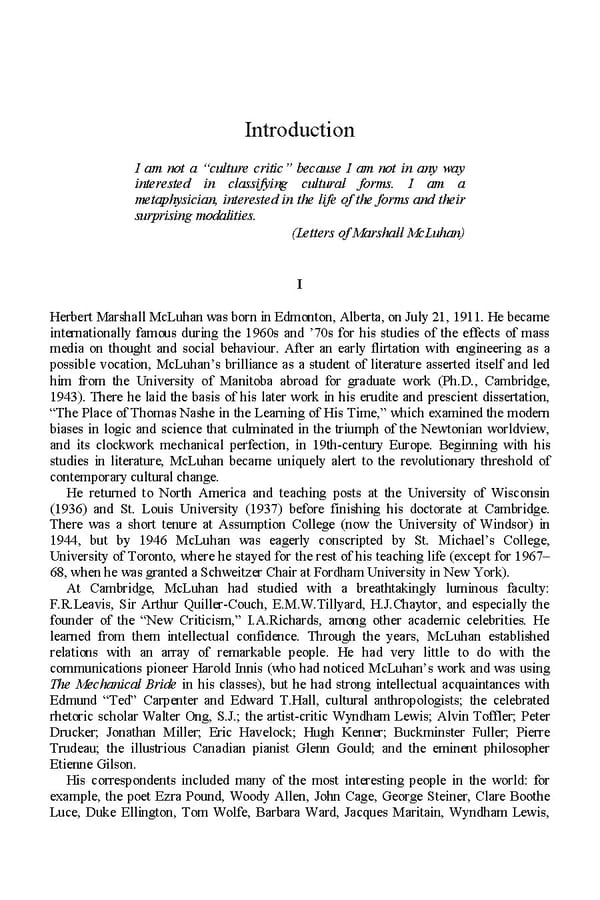Introduction I am not a “culture critic” because I am not in any way interested in classifying cultural forms. I am a metaphysician, interested in the life of the forms and their surprising modalities. (Letters of Marshall McLuhan) I Herbert Marshall McLuhan was born in Edmonton, Alberta, on July 21, 1911. He became internationally famous during the 1960s and ’70s for his studies of the effects of mass media on thought and social behaviour. After an early flirtation with engineering as a possible vocation, McLuhan’s brilliance as a student of literature asserted itself and led him from the University of Manitoba abroad for graduate work (Ph.D., Cambridge, 1943). There he laid the basis of his later work in his erudite and prescient dissertation, “The Place of Thomas Nashe in the Learning of His Time,” which examined the modern biases in logic and science that culminated in the triumph of the Newtonian worldview, and its clockwork mechanical perfection, in 19th-century Europe. Beginning with his studies in literature, McLuhan became uniquely alert to the revolutionary threshold of contemporary cultural change. He returned to North America and teaching posts at the University of Wisconsin (1936) and St. Louis University (1937) before finishing his doctorate at Cambridge. There was a short tenure at Assumption College (now the University of Windsor) in 1944, but by 1946 McLuhan was eagerly conscripted by St. Michael’s College, University of Toronto, where he stayed for the rest of his teaching life (except for 1967– 68, when he was granted a Schweitzer Chair at Fordham University in New York). At Cambridge, McLuhan had studied with a breathtakingly luminous faculty: F.R.Leavis, Sir Arthur Quiller-Couch, E.M.W.Tillyard, H.J.Chaytor, and especially the founder of the “New Criticism,” I.A.Richards, among other academic celebrities. He learned from them intellectual confidence. Through the years, McLuhan established relations with an array of remarkable people. He had very little to do with the communications pioneer Harold Innis (who had noticed McLuhan’s work and was using The Mechanical Bride in his classes), but he had strong intellectual acquaintances with Edmund “Ted” Carpenter and Edward T.Hall, cultural anthropologists; the celebrated rhetoric scholar Walter Ong, S.J.; the artist-critic Wyndham Lewis; Alvin Toffler; Peter Drucker; Jonathan Miller; Eric Havelock; Hugh Kenner; Buckminster Fuller; Pierre Trudeau; the illustrious Canadian pianist Glenn Gould; and the eminent philosopher Etienne Gilson. His correspondents included many of the most interesting people in the world: for example, the poet Ezra Pound, Woody Allen, John Cage, George Steiner, Clare Boothe Luce, Duke Ellington, Tom Wolfe, Barbara Ward, Jacques Maritain, Wyndham Lewis,
 Essential McLuhan Page 7 Page 9
Essential McLuhan Page 7 Page 9